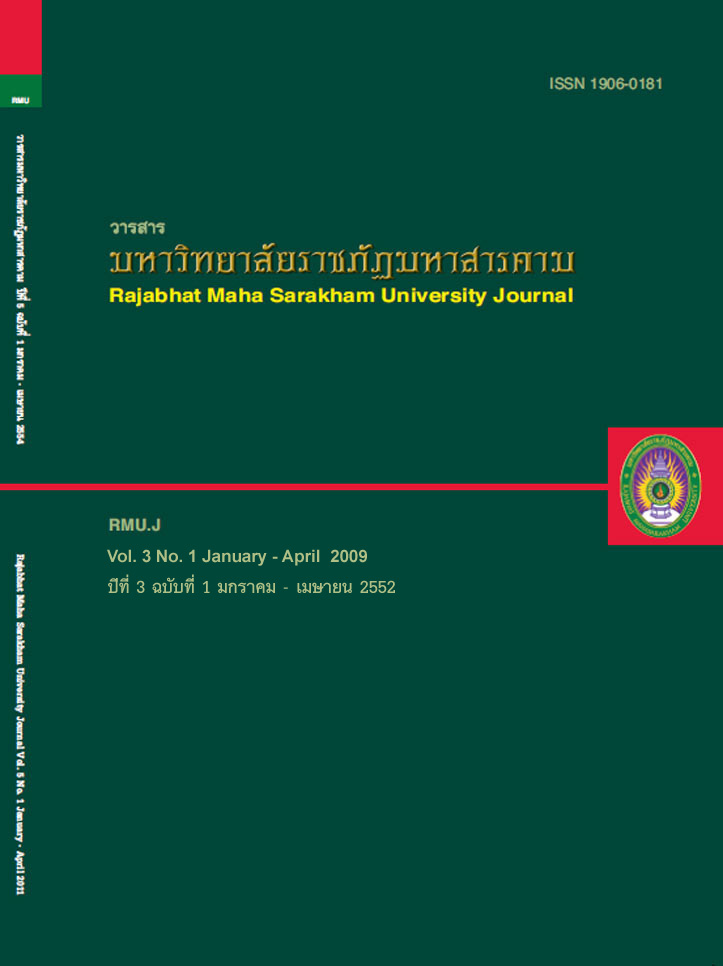การพัฒนารูปแบบการสอนใช้คอมพิวเตอร์ช่วยเรียนแบบอัจฉริยะผ่านเครือข่าย คอมพิวเตอร์ รายวิชาเทคโนโลยีสารสนเทศเพื่อชีวิต A Development of Intelligent Computer Assisted Instruction Model Using Computer Network for Information Technology for life course
Main Article Content
บทคัดย่อ
การวิจัยนี้มีวัตถุประสงค์ ประการแรกเพื่อพัฒนารูปแบบการสอนใช้คอมพิวเตอร์ช่วยเรียนแบบอัจฉริยะผ่านเครือข่ายคอมพิวเตอร์ สำหรับจัดการเรียนการสอนรายวิชาเทคโนโลยีสารสนเทศเพื่อชีวิตตามหลักสูตรมหาวิทยาลัยราชภัฏมหาสารคาม
ประการที่สองเพื่อพัฒนาบทเรียนการสอนใช้คอมพิวเตอร์ช่วยเรียนแบบอัจฉริยะผ่านเครือข่ายคอมพิวเตอร์ รายวิชาเทคโนโลยีสารสนเทศเพื่อชีวิต ตามรูปแบบที่พัฒนาขึ้น ประการที่สามเพื่อเปรียบเทียบผลสัมฤทธิ์ทางการเรียนระหว่างกลุ่มผู้เรียนที่จัด
กิจกรรมการเรียนการสอนด้วยบทเรียนการสอนใช้คอมพิวเตอร์ช่วยเรียนแบบอัจฉริยะผ่านเครือข่ายคอมพิวเตอร์กับกลุ่มผู้เรียนที่จัดกิจกรรมการเรียนการสอนปกติ และ ประการที่สี่เพื่อสำรวจความพึงพอใจของผู้เรียนที่ได้รับการจัดกิจกรรม การเรียนการ
เรียนการสอนด้วยบทเรียนการสอนใช้คอมพิวเตอร์ช่วยเรียนแบบอัจฉริยะผ่านเครือข่ายคอมพิวเตอร์ กลุ่มตัวอย่างเป็นผู้เชี่ยวชาญ จำนวน 12 คน และนักศึกษามหาวิทยาลัยราชภัฏมหาสารคาม ชั้นปีที่ 1 จำนวน 60 คน ใช้แผน การทดลองแบบ
Control - group pretest - posttest design เครื่องมือการวิจัย ประกอบด้วย บทเรียนที่พัฒนา แบบทดสอบวัดผลสัมฤทธิ์
ทางการเรียน และแบบประเมินความพึงพอใจนักเรียน สถิติที่ใช้ คือ ร้อยละ ค่าเฉลี่ย ส่วนเบี่ยงเบนมาตรฐาน และ t-test
(Independent sample) ผลการวิจัยพบว่า
1. การสังเคราะห์รูปแบบ ได้กรอบหน้าที่และข้อมูลแต่ละโมดูล เพื่อใช้ในการพัฒนาบทเรียนวิชาเทคโนโลยีสารสนเทศ
เพื่อชีวิต ซึ่งเป็นรายวิชาพื้นฐานทั่วไปของหลักสูตรในมหาวิทยาลัยราชภัฏมหาสารคาม
2. การหาคุณภาพบทเรียนโดยผู้เชี่ยวชาญ จำนวน 5 ท่าน ผลการประเมินพบว่าบทเรียนมีคุณภาพสูงโดยค่าเฉลี่ย
4.37 และส่วนเบี่ยงเบนมาตรฐาน 0.54
3. การหาประสิทธิภาพบทเรียนตามเกณฑ์ E1/E2 (80/80) พบว่า บทเรียนมีประสิทธิภาพ 86.51/85.84มีประสิทธิภาพสูงกว่าเกณฑ์ที่กำหนด
4. ผลสัมฤทธิ์ทางการเรียนระหว่างกลุ่มทดลองที่เรียนด้วยบทเรียนที่พัฒนาขึ้นกับกลุ่มควบคุมที่เรียนด้วยบทเรียนปกติพบว่า ผู้เรียนกลุ่มทดลองมีคะแนนเฉลี่ยหลังเรียนมากกว่ากลุ่มควบคุมอย่างมีนัยสำคัญทางสถิติที่ระดับ .05
5. การประเมินความพึงพอใจผู้เรียนกลุ่มทดลองที่มีต่อบทเรียนที่พัฒนาขึ้น พบว่า ผู้เรียนกลุ่มทดลองมีความพึงพอใจต่อบทเรียนในระดับสูง เฉลี่ย 4.59 ค่าส่วนเบี่ยงเบนมาตรฐาน 0.59
The objectives of this study were 1) to develop of Intelligent Computer Assisted Instruction Model
via computer network for Information Technology for Life in the curriculum of Rajabhat Maha Sarakham
University, 2) to develop the learning units designed by the Intelligent Computer Assisted Instruction
Model for Information Technology for Life, 3) compare the achievement of the students in the experimental
groups who learned with the activities designed by the Intelligent Computer Assisted Instruction Model to
the students in the controlled group who had a regular class, 4) to analyze the satisfaction of the students
with the lessons designed by the Intelligent Computer Assisted Instruction Model via Computer Network.
The sample subjects were divided into two groups: twelve experts and sixty first year
undergraduate students at Rajabhat Maha Sarakham University. The research methodology was Control-
Group Pretest-Posttest Design. The instruments used were developed lessons, an achievement test, and a
rating-scale questionnaire. The research statistics were percentage, mean, standard deviation and t-test
(Independent sample)
Results of the research were as follows:
According to the model synthesis, the findings indicated the details of function and the data of
each module for the development of learning units designed by the Intelligent Computer Assisted
Instruction Model for Information Technology for Life
The finding indicated that the lessons regarding the quality assessment by the experts were
high-level quality lessons. The average level of the opinion was 4.37.
In regard to the efficiency of the lessons, it was found that the efficiency index of the lesson was
86.51/85.84, which was higher than the assigned criteria of the efficiency (80/80).
In regard to the learning achievement, it was found that the average score of the students in the
experimental groups was significantly higher than the score of the students in the controlled group at
the.05 level.
The finding showed that the average level of the satisfaction of the students in the experimental
groups with the lessons designed by the Intelligent Computer Assisted Instruction Model via Computer
Network was highest. The average level of the satisfaction was 4.59.
Article Details
1. บทความที่ลงตีพิมพ์ทุกเรื่องได้รับการตรวจทางวิชาการโดยผู้ประเมินอิสระ ผู้ทรงคุณวุฒิ (Peer Review) สาขาที่เกี่ยวข้อง อย่างน้อย 3 ท่าน ในรูปแบบ Double blind review
2. ข้อคิดเห็นใด ๆ ของบทความที่ลงตีพิมพ์ในวารสารมหาวิทยาลัยราชภัฏมหาสารคาม นี้เป็นของผู้เขียน คณะผู้จัดทำวารสารไม่จำเป็นต้องเห็นด้วย
3. กองบรรณาธิการวารสารมหาวิทยาลัยราชภัฏมหาสารคาม ไม่สงวนสิทธิ์การคัดลอกแต่ให้อ้างอิงแสดงที่มา


